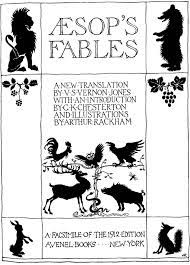Similarity between Æsop's Tale and The Spider and the Fly
An invitation prompted
by selfishness is not to be accepted. It is the moral that we receive from both
The Æsop'S Tale for Children’s The
Wolf & the Goat and The Spider and The Fly by Mary Botham Howitt. There is a
close similarity between both of these two (one is a fable another being a didactic
poem). Let us first discuss both of them and see their similarity.
A hungry Wolf spied a Goat browsing at the top of a steep cliff where he could not possibly get at her.
"That is a very
dangerous place for you," he called out, pretending to be very anxious about
the Goat's safety. "What if you should fall! Please listen to me and come
down! Here you can get all you want of the finest, tenderest grass in the
country."
The Goat looked over the
edge of the cliff.
"How very, very
anxious you are about me," she said, "and how generous you are with
your grass! But I know you! It's your own appetite you are thinking of, not
mine!"
The goat is not, however,
tricked by the sly wolf.
In the poem, the spider tries to convince the fly to step into his home. He tries to entice her with the promise of showing her some pretty things in his home. He offers her a comfortable bed. He tries to deceive her by faking concern for the fly’s weariness. He tries to befriend the fly by cordially welcoming her to his pantry. However, the fly is smart enough not to fall into his trap. She repeatedly dismisses him by telling him that she is aware of what happens to the victims that enter his trap.
The spider then attempts
to please her vanity by calling her wings beautiful and her eyes bright and
shiny. He flatters the fly to trick her. He even suggests the fly look at
her beauty in his home. The fly is flattered by his deceiving
gest-complimented plans on revisiting the spider. And when they fly back to
the spider, he instantly catches her. The poem ends with a small message to all
the children. The poet cautions the children against flattery by evil
counselors. She asks them to take a lesson from the fly’s foolishness resulting
in her tragic end and warns them not to be deceived by false flattery.
The predominant tone of
the poem is one of flattery and deception. This poem tells the story of a
cunning spider who entices a little fly with his tricky words to fall into his
trap. This fable depicts a very prominent and common folly of human beings- the
flaw of being easily convinced by false flattery. In this poem, the cunning
spider employs several ways to allure the fly into his home. He cordially
invites the fly into his ‘parlor’ to show her pretty things and offers her a
comfortable bed and good food to eat. Failing to tempt the fly with all these,
the spider uses the strongest weapon he has that is sure to take her down. He
indulges in the fake flattery of the fly. The traps the naive fly through the
seduction of flattery. No matter how dedicated the fly was about not entering
the spider’s evil web, she succumbed in the end; the spider artfully
deceives her into stepping into his home.
The poem begins with
the speaker describing
the first efforts of a spider to lure a fly into his dark and evil home. On his
first attempt, the spider tells the fly that his “parlor” is lovely. It is a
place anyone would want to be and it is open for the fly to visit. She declines
and then declines three more times as the spider tries other tactics to lure
her in. The fly repeatedly states that she does not intend to see this
home as she has heard the tales of the victims subjected to his evilness and
cruelty.
However, as a perfect predator with a lot
of experience, the spider is sure that the fly will melt at his false praises. He
adds on the enticing detail that it is the “prettiest little parlor.” The
spider is trying to play down the fear the fly should feel about his lair. It
is “little” and pretty—not at all foreboding. From the first line, it is easy
to tell that the spider has ulterior motives. A reader will be very aware that
nothing good will happen to the fly if she agrees. In order to reach the
spider’s home, one must go up a “winding stair.” Once there, there are curious
things to be seen. These two lines make the lair seem somewhat magical, and
much more tempting. The poet warns people not to pay heed to false
flattery and enticements and learn from the fly’s mistake. The poem’s tone of
falsehood, deception, and meanness represents the miseries of the beings
that are silly enough to fall for that evilness.
Both these teach us to be
prudent against any flattery and enticement.







No comments:
Post a Comment
Thanks for your views. We will work on it. Meanwhile, do visit this blog for an interesting Article tomorrow. Have a nice day.